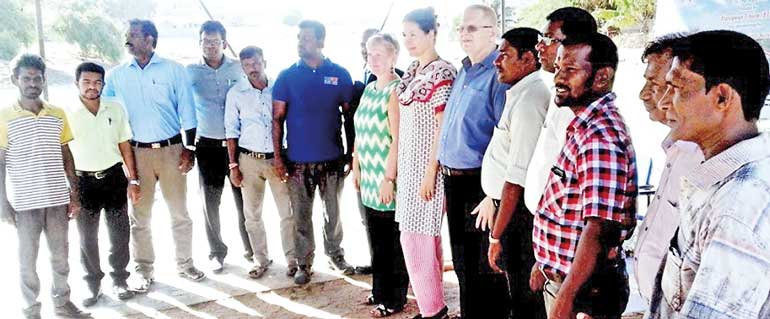Monday Feb 23, 2026
Monday Feb 23, 2026
Tuesday, 5 September 2017 00:00 - - {{hitsCtrl.values.hits}}
 Officials from the EU and UNOPS who attended the handover ceremony including Libuse Soukupova - Head of Development Cooperation of the European Union; Sudhir Muralidharan - Head of Support Services, UNOPS Sri Lanka; Xavier Lamberd - Secretary of the Mannar Urban Council and M.A.J. Thuram - Regional Assistant Commissioner of Local Government
Officials from the EU and UNOPS who attended the handover ceremony including Libuse Soukupova - Head of Development Cooperation of the European Union; Sudhir Muralidharan - Head of Support Services, UNOPS Sri Lanka; Xavier Lamberd - Secretary of the Mannar Urban Council and M.A.J. Thuram - Regional Assistant Commissioner of Local Government
The European Union and United Nations Office for Project Services (UNOPS) officially handed over new and renovated infrastructure critical for flood control within the Mannar urban council area during a ceremony organised in Mannar on 29 August.
This infrastructure included over 14 kilometres of drainage canals, 117 culverts and the renovation of six ponds within the urban council that are critical for flood water control and improving ground water quality.
These activities were implemented with financial assistance provided through the European Union Support to District Development Programme (EU-SDDP), with a total financial envelope of EUR 60 million. The program aims to support the Sri Lankan Government’s thrust for economic and social development in seven conflict-affected districts encompassing half a million people. The EU-SDDP is implemented by six organisations including UNOPS.
The event, organised near the Nedunkulam Tank, was graced by Libuse Soukupova - Head of Development Cooperation, Delegation of European Union to Sri Lanka and Maldives; Sudhir Muralidharan - Head of Support Services of UNOPS Sri Lanka; Xavier Lamberd - Secretary of the Mannar UC and M.A.J. Thuram - Regional ACLG for Mannar. A walkway and children’s play area were also developed around the Nedunkulam Tank as part of the renovation and this has made the site a favourite recreational location for members of the community.
Speaking at the event, Soukupova said: “Seasonal flooding has been a major problem for Mannar over the years and this has created negative impacts on the economic and social activities of the people.”
“The European Union and UNOPS first partnered to resolve this problem in 2008 through a livelihood stabilisation program, under which UNOPS carried out a detailed hydrological study of the area. The EU-SDDP continued the work that was started under this initiative to help make the people of Mannar safe from the impact of flooding,” she added.
Muralidharan, also speaking at the event, stated: “I want to highlight today the importance of maintaining these facilities. Everyone here today – not only the government officials, but also importantly the community members - has a responsibility in making sure that the drainage lines and the ponds are well maintained.”
UNOPS, in partnership with the urban council other partner government agencies and the communities, has prepared a Drainage Maintenance Manual that has set out the processes for ensuring the cleanliness of the drainage lines and ponds so that they do not get blocked by garbage during rains. As part of the EU-SDDP activities, UNOPS also supported the urban council in reaching out to the community members to raise awareness about their responsibility in maintaining these facilities.
The handover event saw the participation of a number of stakeholders from Government departments which had played an important role in the UNOPS component of the project, including the Road Development Authority, Road Development Department, Sri Lanka Telecom, Ceylon Electricity Board, Central Environmental Authority and National Water Supply and Drainage Board. The event also saw the participation of over 70 community members including the Rural Development Society representative who will be important partners in maintaining the facilities that were developed.
Under the EU-SDDP framework, UNOPS is contributing to the construction and rehabilitation of social infrastructure and specific capacity building activities in the Batticaloa, Mannar and Vavuniya districts to benefit more than 450,000 people.